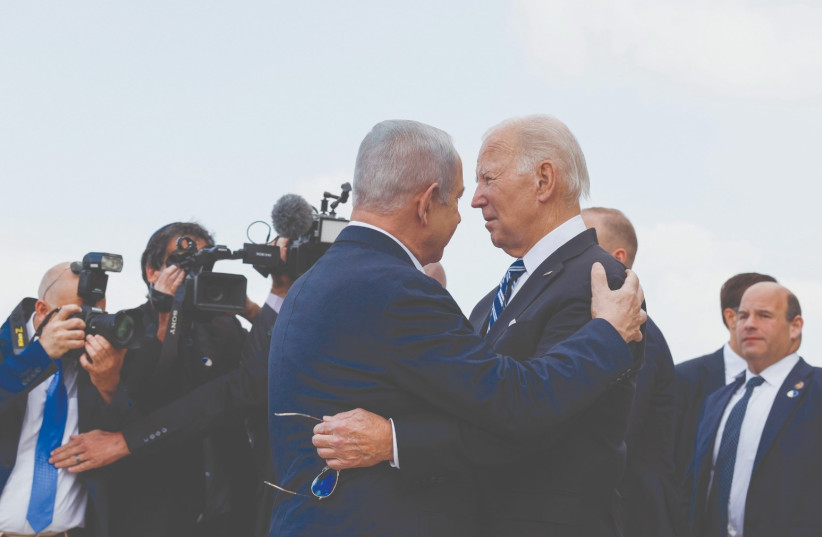There are a number of reasons that US President Joe Biden is likely annoyed with Prime Minister Benjamin Netanyahu.
For one, Netanyahu has distanced himself from Biden’s “day after” Gaza plan of linking Israeli normalization with Saudi Arabia, with a strengthened Palestinian Authority-granted control of Gaza, all leading toward an eventual two-state scenario.
Netanyahu’s insistence on keeping his far-Right partners Itamar Ben-Gvir and Bezalel Smotrich in the coalition must also rankle, as well as Biden’s perception that the Israeli government is doing little or nothing to rein in settler extremists in the West Bank, as evidenced by the president’s executive order last week against four settler offenders.
But above all, Netanyahu’s steadfastness about continuing the Gaza war to its ultimate conclusion of invading Rafah and eliminating Hamas’s remaining fighters and capabilities – without a clear-cut plan to provide safe passage for the more than a million Gazans who have converged on the beleaguered city during the war – is probably the latest issue that prompted Biden to reportedly talk about Netanyahu in meetings in, shall we say, undiplomatic terms.

To paraphrase an old joke: “You can’t call my prime minister an a-hole – only we can do that.” Surely, many people in Israel feel, like Biden reportedly does, that Netanyahu prefers to keep the war going for as long as possible, for his own political needs: keeping the coalition in place, and staving off the eventual state probe and the likely ruling for his dismissal.
And with every Gazan that is killed in the war, Biden is losing political support for his reelection campaign from the progressive side of his Democratic constituency.
While both men have their own motives for their actions, that shouldn’t get in the way of some irrefutable facts.
Indeed, in its just and necessary war against Hamas, Israel has killed thousands of Palestinian residents of Gaza. It’s also true that a sizeable number of the victims are Hamas terrorists, a tidbit that’s never included when the “Gaza Health Ministry” – a transparent euphemism for Hamas – announces the number of those killed in Israeli attacks.
It’s also true that a major military operation in Rafah will put many more Gaza civilians in danger of injury or death, even if a plan of safe passage is implemented.
On the other side of the truth coin is that Hamas has, until now, not offered a reasonable formula for a ceasefire that would bring hostages back and not entail a total Israel withdrawal from Gaza – which in essence would mean the end of the war with the terror group still in charge and not decimated.
The working policy among Israel’s decision makers in government and the IDF is that only more military pressure on Hamas will force them to make concessions and agree to a deal that will free more hostages.
Israelis support Netanyahu's plan
Biden may hold a grudge against Netanyahu, but the truth is that war cabinet Minister Benny Gantz – who some see as the great moderate alternative to Netanyahu – supports the broadening of fighting in southern Gaza and Rafah.
“There is no question about the need to act in any place in which there is terror. Broad action in Rafah, as we said in the past, is not in question,” Gantz said, hours after the brilliant and daring IDF rescue operation of hostages Fernando Marman, 61, and Louis Har, 70, from Rafah.
That seems to be the consensus in Israel. We are now closing in on the last Hamas stronghold in Gaza, where its leadership and the remaining hostages are presumed to be.
Instead of putting pressure on Israel to stop its campaign, the US and the rest of the world should be upping pressure on the genocidal terrorist group to release the hostages and surrender – and those countries so concerned with the civilians in Rafah should be working with Israel to provide safe passage and shelter for them so that the IDF can do its job.
If there is a valid proposal on the table, like the one reported on Tuesday by Biden of a six-week lull in fighting and a partial hostage release that would put off the Rafah campaign, then Israel must consider it.
But ultimately, only Jerusalem can decide what the best policy to pursue is – even if it means annoying its best friend in Washington.
